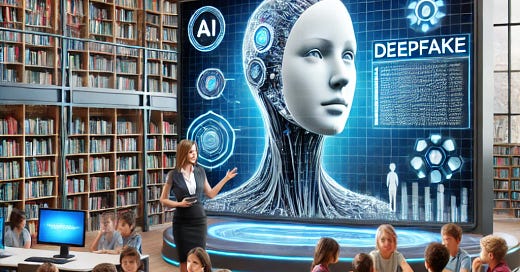AI Ethics in the Age of AGI: Addressing Bias, Misinformation, and Responsible AI Use
Part 3 in our Series on Preparing Schools and Educators for AGI
🚀 Not a subscriber yet? Get exclusive AI insights straight to your inbox! Subscribe here to stay ahead in AI and education.
Why subscribe? As a subscriber, you’ll get access to exclusive deep dives into AI’s impact on education, expert insights, practical strategies for teachers and librarians, and curated reading lists to keep you informed. This newsletter series was inspired by the thought-provoking New York Times article, which highlighted how unprepared many institutions are for AGI. As educators and school librarians, we need to start planning now.
With Artificial General Intelligence (AGI) on the horizon, understanding AI ethics is no longer optional—it’s essential. The power of AI to generate information, automate decisions, and personalize learning is growing. However, AI systems are not neutral, and educators and librarians must equip students with the skills to critically evaluate and responsibly engage with AI technologies.
Welcome to the third installment of our series on preparing schools and educators for AGI. This issue focuses on the ethical challenges that come with AI in education—bias, misinformation, and responsible AI use.
NotebookLM Deep Dive:
The Role of School Librarians in AI Ethics Education
School librarians play a critical role in guiding students and educators through the complexities of AI literacy and ethics. As information professionals, librarians are uniquely positioned to:
🔹 Teach Media Literacy – Helping students critically evaluate AI-generated information and identify misinformation.
🔹 Curate Reliable AI Resources – Providing access to vetted materials and research about AI and its implications.
🔹 Support Ethical Research Practices – Encouraging proper citation of AI-generated content and promoting academic integrity.
🔹 Facilitate AI Literacy Workshops – Hosting discussions, book clubs, and training sessions on the ethical use of AI in education.
Librarians are the frontline defenders against misinformation and can empower students to navigate AI-generated content with confidence and responsibility.
Ethical Corner: The Risks of AI-Generated Misinformation
One of the most pressing concerns in AI ethics is its ability to generate false or misleading information at an unprecedented scale. The article "What to Know About AI Misinformation: A Primer for Teachers" provides educators with essential insights into how AI can produce misinformation and offers strategies to help students detect and critically evaluate such content.
Why It Matters: AI-powered misinformation is becoming harder to detect, making media literacy and critical thinking more essential than ever for students.
Real-World Impact: AI-generated content, such as deepfakes and fabricated news articles, can manipulate public opinion and erode trust in factual information.
What Educators and Librarians Can Do: Teach students fact-checking techniques, encourage them to cross-reference sources, and introduce them to tools that help detect AI-generated misinformation (such as reverse image searches and deepfake detectors).
This challenge will only intensify with AGI, as future AI models become more autonomous and capable of producing highly persuasive content. Educators and librarians play a key role in preparing students to critically engage with AI-generated media.
How Educators and Librarians Can Teach Responsible AI Use
🔹 Teach AI Literacy First – Ensure students understand how AI works, where it pulls data from, and its limitations before they begin using it for learning.
🔹 Use AI Bias Case Studies – Show students real-world examples of AI bias in hiring, policing, and even educational grading systems. Discuss how bias can impact decision-making.
🔹 Encourage Fact-Checking & Source Verification – Teach students to use multiple sources and fact-check AI-generated content against credible databases.
🔹 Discuss AI's Role in Academic Integrity – Set classroom and library guidelines for when AI use is appropriate and when it crosses ethical boundaries.
🔹 Debate AI Ethics in the Classroom and Library – Use ethical dilemmas related to AI to spark discussions about the role AI should play in education and society.
Further Reading on AI Ethics
Here are some sources to deepen your understanding of AI ethics and AGI’s impact on education:
Ethical guidelines on the use of artificial intelligence and data in teaching and learning for educators – A guide to responsible AI use in classrooms and libraries.
AI Bias Examples – A breakdown of AI bias, including real-world examples and solutions.
Ethical AI for Teaching and Learning – Strategies to help educators and librarians recognize and fact-check AI-created content.
The Ethics of Artificial Intelligence – A deep dive into AGI's ethical challenges and what educators should prepare for.
What’s Next?
Understanding AI ethics is crucial as we move toward AGI. Whether AI is generating content, influencing decision-making, or transforming education, students need critical thinking skills to navigate this evolving landscape. As AGI advances, educators and librarians must play a key role in shaping the next generation’s ethical AI understanding.
In the next issue, we’ll explore AI-Powered Personalized Learning: Benefits, Risks, and Best Practices—how AI is transforming instruction and what teachers and librarians need to know to implement it effectively.
🚀 Not a subscriber yet? Don’t miss out on exclusive AI insights—subscribe here today!
How are you addressing AI ethics in your classroom or library? Share your thoughts with us! 🚀





It looks like the article on AI bias with real world examples isn't available anymore, do you have another resource you could provide?